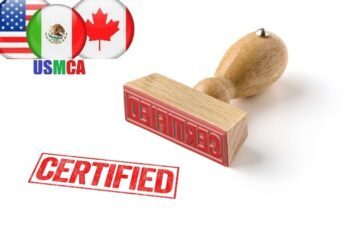By: Bruce Leeds, Senior Counsel, Braumiller Law Group
The US-Mexico-Canada Agreement (USMCA) replaces NAFTA and goes into effect on July 1 of this year.
One of the major changes to come out of this trade agreement is elimination of the NAFTA Certificate of Origin. Instead, the USMCA replaces the Certificate of Origin with a certification. In this regard, the USMCA will more closely resemble other free trade agreements, such as the Korean and Australian, which also utilize a certification.
According to the Interim USMCA Implementation Instructions published by US Customs & Border Protection (CBP) “an importer may submit an importer, exporter, or producer certification. The importer is responsible for exercising reasonable care concerning the accuracy of all documentation submitted to CBP.”
The producer is the company that actually made the product. The exporter is the party in Canada or Mexico that sold it for export to the US. In many cases the producer and exporter are the same party, but they can be different. The importer is, of course, you.
The certification is not required for non-commercial shipments and imports valued at less than $2500. However, if there is evidence that the importer is valuing a series of shipments at less than $2500 to evade compliance with the certification requirements, the appropriate Center of Excellence & Expertise can require a certification for all the importer’s shipments, regardless of value.
An importer must have a valid certification in its possession at the time a claim for USMCA benefits (exemption from duty and MPF) is made. Normally this is at the time of entry. If an importer does not have a certification in its possession at the time of entry, it can pay the duty and MPF and either use the Reconciliation Prototype or a claim under 19 UCS 1520(d) up to one year after the date of entry to obtain refund of the duty although unlike NAFTA, the MPF is not refundable. The claim under reconciliation or 1520(d) must be accompanied by a valid certification.
There is no prescribed format for the certification. It can be on the commercial invoice or an attachment. It can be a hard copy or electronic document, providing it contains all the required information. The certification may be for a single shipment, or it can be a blanket certification covering shipments for a period up to one year.
So, what information is required on the certification? Here are the minimum data elements:
- Name, address, and contact info of producer, exporter or importer
- Certifier’s name, title, company and contact info
- Description of product(s) and HTS classification to at least 6 digits. The description must be sufficiently detailed to verify that it covers the articles in the shipment
- The origin criteria under which product qualifies
- If single shipment the invoice number of the goods
- If a blanket certification the blanket period
- Signature, date and certification statement
The certification must also contain the following statement signed by the certifier:
“I certify that the goods described in this document qualify as originating and the information contained in this document is true and accurate. I assume responsibility for proving such representations and agree to maintain and present upon request, or to make available during a verification visit, documentation necessary to support this certification.”
(Name, title, signature, date)
Are you ready to sign the above? Also, are you ready to present supporting documentation during a verification visit by US, Canadian, or Mexican Customs authorities?
What documents would those be? Here are some suggestions:
- Priced bills of material
- A process description for production of the imported article
- Manufacturer’s affidavits or origin certifications for parts and materials claimed to be of North American origin
- If the party exporting to the US is not the producer, a certification or detailed information from the actual producer
The certifications and supporting documents are kept by the importer for 5 years. They are provided to CBP – or possibly Canadian or Mexican Customs – on request.
Let’s skip ahead on the calendar to July 1, 2020. You are continuing to receive shipments from Canada and Mexico. They are arriving with no USMCA certifications. Now you have a problem. Do you claim USMCA benefits with no certification? Do you complete and sign the certification with no supporting information? Do you hold up the clearances and urgently request certifications from the suppliers? None of these are good choices.
The better choice is to do some pre-planning before July 1:
- Check the rules of origin for the products you import. They may be different under USMCA.
- Determine whether the products even qualify for USMCA benefits – they may not meet the rules of origin.
- Amend your company’s purchase orders with the suppliers to require they either provide a single shipment or blanket certification for the articles being imported or agree to provide you supporting documentation so you can prepare and execute certifications.
Finally, if you export to Canada and Mexico certifications will also be an issue. It is best to settle in advance which party will be doing the rule of origin analysis and maintaining supporting documents, and which party will be executing the certifications.
The USMCA has benefits for many people and industries, but for compliance personnel….not so much.



























